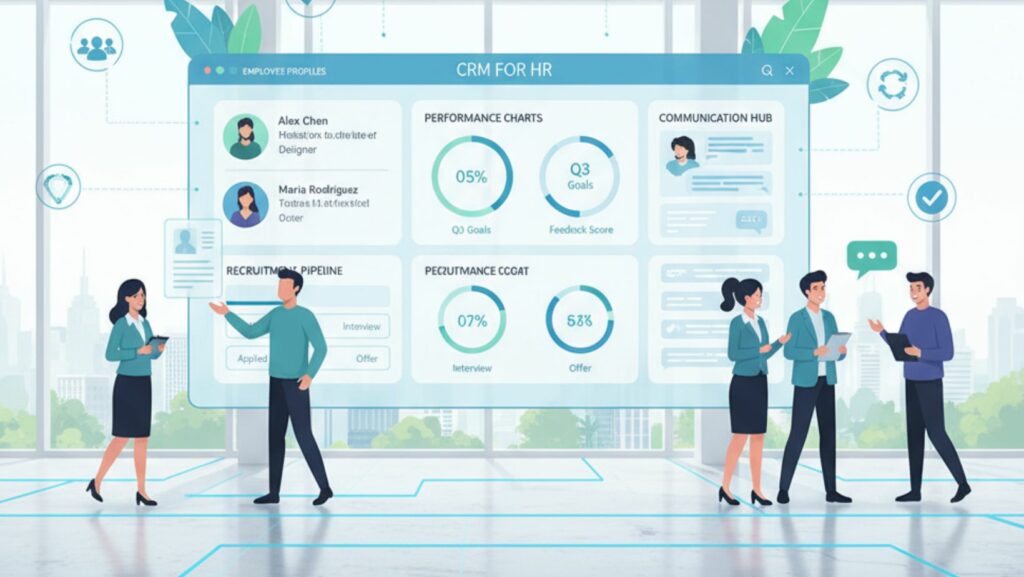In today’s business environment, organizations are under constant pressure to optimize processes, retain talent, and ensure employee engagement. Traditional methods of handling HR operations – paper files, isolated spreadsheets, and disconnected communication tools – are no longer sufficient. This is where CRM for HR (Customer Relationship Management adapted for Human Resources) comes into play. It provides HR departments with the ability to streamline workflows, improve collaboration, and enhance the employee experience.
By using CRM technology tailored for HR functions, businesses gain not only a structured approach to managing talent but also an integrated ecosystem where recruitment, onboarding, training, and retention are tied to real-time analytics and automation. In this comprehensive guide, we’ll explore how a CRM for HR works, the key benefits it offers, the top tools available (including Bitrix24), and answer some common FAQs to help you decide whether implementing one is right for your organization.
How a CRM for HR Works
A CRM system is traditionally known for managing customer relationships, but the same logic applies when managing employees. HR is, after all, about relationships – between employers and employees, managers and teams, as well as recruiters and candidates. When reimagined for HR, a CRM acts as a centralized database and workflow tool designed to track the entire employee lifecycle.
Core Mechanisms
- Centralized Data Repository
All employee information – personal details, job history, performance reviews, training progress, and feedback – lives in one accessible platform. This eliminates duplication, prevents miscommunication, and allows for easy retrieval of records. - Recruitment Pipeline Management
Just as a CRM manages leads in sales, it manages candidates in HR. Recruiters can track where each candidate is in the hiring process, schedule interviews, collect feedback, and automate communications. - Employee Lifecycle Automation
From onboarding to exit interviews, HR teams can automate repetitive tasks such as sending welcome emails, assigning training modules, or conducting periodic surveys. - Integration with Communication Tools
A CRM for HR integrates with chat, email, and video conferencing platforms. This allows HR staff to communicate with employees and candidates without leaving the system. - Analytics and Reporting
Dashboards highlight key insights: employee satisfaction rates, time-to-hire metrics, training completion percentages, turnover risks, and more. These data points help HR managers make proactive decisions. - Collaboration Between Departments
HR doesn’t operate in isolation. CRM for HR systems allow coordination with finance (payroll), operations (shift planning), and leadership (strategic planning).
In short, the software serves as both an employee relationship manager and a productivity enhancer, ensuring HR is no longer bogged down by administrative tasks but empowered to focus on people-centric strategies.
Key Benefits
Adopting a CRM for HR brings tangible advantages across the entire organization. Below are the most impactful benefits:
1. Improved Recruitment and Talent Acquisition
- Streamlined applicant tracking makes it easier to evaluate resumes, store candidate information, and coordinate interviews.
- Automated follow-ups improve the candidate experience, reducing the chance of losing talent to competitors.
- Analytics help recruiters identify the best sources of candidates, improving ROI on recruitment campaigns.
2. Enhanced Employee Engagement
- Personalized communication, recognition programs, and internal surveys can be managed directly within the CRM.
- Employees feel heard and valued, leading to stronger engagement and retention.
3. Data-Driven Decision Making
- HR managers no longer rely solely on intuition. They can base decisions on hard data such as turnover rates, absenteeism patterns, or training completion.
- Predictive analytics help forecast future needs, ensuring workforce readiness.
4. Increased Efficiency Through Automation
- Routine tasks such as leave requests, approvals, and reminders are automated.
- This frees HR professionals to focus on strategic initiatives like succession planning and leadership development.
5. Better Collaboration and Transparency
- Managers and employees access the same platform, ensuring alignment.
- Performance reviews and career development discussions are transparent, documented, and easily trackable.
6. Compliance and Security
- CRMs for HR store documents like contracts, certifications, and policy acknowledgments securely.
- Compliance with labor laws, GDPR, or other data privacy regulations becomes easier.
7. Integration with Business Processes
- HR is not siloed but connected to other areas such as CRM for sales or ERP for finance.
- This integration ensures that the human side of business operations is aligned with financial and operational goals.
Best CRM for HR
Selecting the right CRM for HR depends on company size, industry, and budget. Below are some of the top human resources CRM platforms that have proven effective in optimizing HR workflows.
1. Bitrix24
Bitrix24 stands out as a comprehensive HR and business management solution. Unlike many tools that focus exclusively on HR, Bitrix24 integrates CRM, project management, HR automation, and communication in one platform.
Key HR Features:
- Employee directory with rich profiles
- Time tracking, absence management, and leave requests
- Recruitment pipeline for candidate tracking
- Built-in communication (chat, video, social intranet)
- Performance monitoring and reporting dashboards
Why It’s Better:
- Combines HR, CRM, and project management in a single system – reducing the need for multiple software subscriptions.
- Available both on cloud and on-premise with strong customization options.
- Free plan with generous features for small businesses, making it cost-effective.
2. Zoho People
Zoho People is a flexible HR solution that automates core functions such as leave management, attendance, and performance tracking.
Highlights:
- Employee self-service portal
- Integration with Zoho ecosystem and third-party apps
- Simple pricing for SMEs
Why It’s Popular:
Zoho is user-friendly, affordable, and integrates seamlessly with other Zoho apps, making it a great choice for small to mid-sized companies.
3. BambooHR
BambooHR is specifically designed for small and medium-sized businesses, focusing on employee-centric features.
Highlights:
- Intuitive HR database and reporting
- Applicant tracking system (ATS)
- Onboarding workflows
- Employee satisfaction surveys
Why It’s Popular:
BambooHR is known for its simplicity, clean interface, and excellent support. It provides just the right features without overwhelming users.
4. Monday.com (HR Workflows)
While Monday.com is primarily a work operating system, it has strong templates for HR functions.
Highlights:
- Recruitment pipelines
- Onboarding workflows
- Training management
- Time-off requests
Why It’s Popular:
Its visual interface and customizable boards make HR processes more transparent. It’s ideal for companies that value flexibility and visualization.
5. Salesforce (with HR Customization)
Salesforce is one of the most powerful CRMs in the world. With customization and add-ons, it can be tailored for HR purposes.
Highlights:
- End-to-end recruitment pipelines
- Integration with payroll and benefits systems
- Advanced analytics and AI-driven insights
Why It’s Popular:
For large enterprises already using Salesforce for sales, customizing it for HR ensures all business units remain under one ecosystem.
6. Workday
Workday is an enterprise-level HR solution focused on human capital management (HCM).
Highlights:
- Recruitment and workforce planning
- Learning and development management
- Advanced reporting and analytics
Why It’s Popular:
Enterprises favor Workday for its scalability, compliance tools, and advanced functionality.
7. Freshteam by Freshworks
Freshteam is a modern HR tool that helps businesses attract, hire, and onboard employees.
Highlights:
- Applicant tracking
- Employee information management
- Onboarding automation
- Integration with Freshworks ecosystem

Why It’s Popular:
Its simplicity, cloud-based interface, and strong recruitment tools make it especially valuable for growing startups.
FAQs
1. What is CRM for HR?
CRM for HR is a system that applies customer relationship management principles to human resources. It manages the employee lifecycle, recruitment, engagement, and retention in a centralized platform.
2. Is CRM for HR different from traditional HR software?
Yes. Traditional HR software often focuses on payroll and compliance, while CRM for HR emphasizes relationship management, engagement, and lifecycle automation.
3. Can small businesses benefit from CRM for HR?
Absolutely. Tools like Bitrix24 and Zoho People provide affordable or free tiers suitable for startups and SMEs, helping them organize HR processes without major costs.
4. Which industries benefit most from CRM for HR?
All industries can benefit, but fast-growing sectors – like technology, healthcare, retail, and services – gain the most due to high employee turnover and recruitment demands.
5. How secure is employee data in CRM for HR platforms?
Most reputable platforms follow strict compliance measures (GDPR, SOC 2, HIPAA where applicable). Always review the vendor’s security certifications before adopting.
6. What’s the ROI of using CRM for HR?
The return on investment comes from reduced recruitment costs, lower turnover, improved productivity, and more efficient use of HR resources.
7. Can CRM for HR integrate with payroll or ERP systems?
Yes. Leading platforms integrate with payroll, ERP, and collaboration tools, ensuring smooth workflows across the business.
Conclusion
CRM for HR is no longer a luxury – it’s a necessity for businesses that want to stay competitive in the digital economy. By centralizing data, automating processes, and fostering better relationships with employees, organizations can boost efficiency and employee satisfaction simultaneously.
Among the top tools, Bitrix24 stands out as a robust, all-in-one solution that merges HR functions with broader business processes. Whether you’re a small startup or a global enterprise, investing in a CRM for HR ensures your most valuable resource – your people – are managed effectively and strategically.



